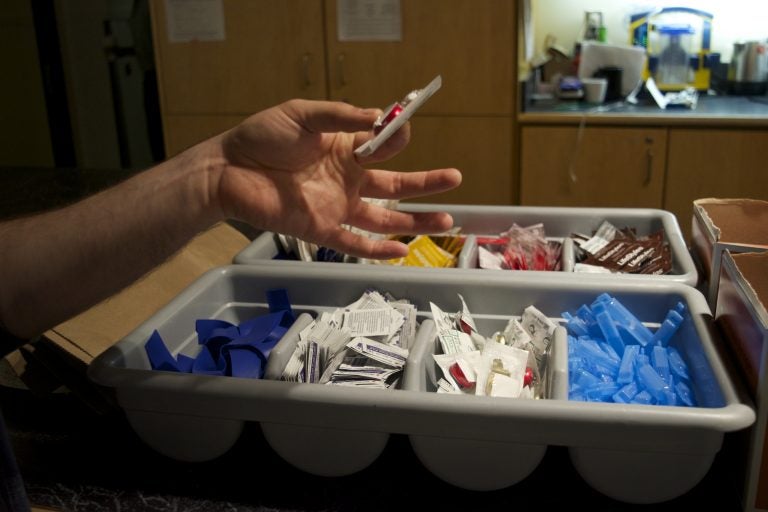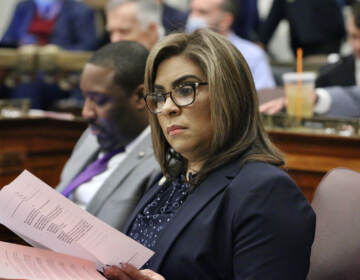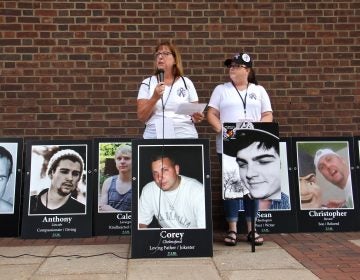Judge to hear nuts and bolts of how Philly supervised injection site would work
Lawyers for Safehouse will lay out how the supervised injection facility would operate. It’s the first hearing since federal prosecutors filed suit.

Insite, Vancouver’s supervised injection facility, provides people with clean injection supplies. (Elana Gordon/WHYY)
The nonprofit Safehouse has its first day in federal court on Monday. The group wants to open an injection facility in Philadelphia’s Kensington neighborhood where people could inject opioids under medical supervision.
In February, William McSwain, the U.S. attorney for the Eastern District of Pennsylvania, filed a civil lawsuit against Safehouse, claiming its intended activities would violate the federal Controlled Substances Act.
At the judge’s request, Monday’s evidentiary hearing will be limited to discussing the services Safehouse proposes to offer and the nuts and bolts of how the supervised injection facility would function.
“We’re grateful to have that opportunity to explain, hopefully to some, that it’s not as scary, it’s not as provocative, it’s not that different from what’s happening now at syringe exchange programs, which are permissible all over the country,” said Safehouse board member Ronda Goldfein, who is an attorney and executive director of the Pennsylvania AIDS Law Project. Representing Safehouse in court will be Ilana H. Eisenstein, with multinational law firm DLA Piper.
Philadelphia has the highest overdose rate of any big city in America. More than 1,100 people died of drug overdoses here in 2018, most of which were caused by opioids. City officials first announced support for such a facility in January 2018. The initiative has backing from Mayor Jim Kenney, the city’s Department of Public Health, and the District Attorney’s Office.
Monday’s hearing, which is allotted time to continue into Tuesday, comes after six months of back-and-forth court filings between Safehouse and the federal government.
The U.S. attorney’s initial complaint asked the judge to rule that supervised injection sites were illegal under the Controlled Substances Act. Safehouse responded that the law does not apply to its proposed activities, and that even if it did, they would be exempt under the Religious Freedom Restoration Act based on the board members’ Judeo-Christian belief in the preservation of life.
In June, McSwain filed a motion for judgment on the proceedings, asking the judge to rule based on the information and arguments filed, and nothing more. Safehouse argued more evidence was needed. In July, the judge, Gerald Austin McHugh, scheduled Monday’s evidentiary hearing.
Goldfein said she would not presume that the judge’s scheduling of the hearing meant he was more likely to deny the Justice Department’s request for a ruling without moving to trial.
In the meantime, community debate around Safehouse has heated up. After board member Ed Rendell, the former Pennsylvania governor and Philadelphia mayor, announced in March that the nonprofit was closing in on a property for the facility in Kensington, neighbors in the area expressed vocal opposition to such a site, and criticized the group for moving too fast and without their input. City Councilman Mark Squilla proposed a zoning change that would prevent the facility from opening there.
Various parties have filed amicus briefs supporting and opposing Safehouse. In favor of a supervised injection site were 11 briefs, representing dozens of current and former prosecutors and law enforcement agents, state and city governments, faith leaders, and families who had lost loved ones to overdose. Supporting the Department of Justice was one brief on behalf of the Fraternal Order of Police and several local community groups that say establishment of a facility in Kensington would only serve to keep drug activity in their neighborhood.
As a federal judge, McHugh has a lot of latitude in the order he makes decisions in the case — and in the range of outcomes that could result from the hearings. Born and raised in Philadelphia, McHugh was appointed by President Barack Obama to the Eastern District bench in 2014. The former president of the Pennsylvania Legal Aid Network, McHugh has a long history of public service and involvement with the Catholic Church.
For now, all he has asked for is a detailed description of Safehouse’s proposed activities.
Its operators say Safehouse will not “make available any illicit narcotic or opioid.” Its staff will not assist participants in injecting drugs, or allow them to assist one another or share syringes, Services will be free, and Safehouse will not produce any revenue.
According to court documents, those wishing to inject drugs illegally would show up at Safehouse, register, and provide demographic information. They would go through a physical and behavioral assessment and be offered a range of overdose-prevention services. From there, they would have two choices: They could either go to the medically supervised observation room, where they could start medication-assisted treatment, get wound care, and receive referrals to primary care, social services, and housing opportunities. Or they could go to the supervised consumption room, where they would be provided sterile syringes, and a medical professional equipped with naloxone, the overdose-reversal drug, would be there to monitor them as they injected their own drugs.
It is unlikely that McHugh would make a definitive ruling as a result of this week’s proceedings, since much of the prosecution’s case centers on Safehouse violating statute 856 of the Controlled Substances Act, known as the “crackhouse statute” and that matter will not be discussed in these hearings. The statute makes it illegal to “knowingly open, lease, rent, use, or maintain any place, whether permanently or temporarily, for the purpose of manufacturing, distributing, or using any controlled substance.”
The heart of Safehouse’s response to that argument is that federal law permits the distribution of clean syringes and the use of naloxone to reverse an overdose, so restricting what happens in between wouldn’t make any sense.
“Do we think that the federal law really envisioned that there would be this gap when the participant is at the greatest point of vulnerability, at the point of use?” asked Goldfein.
Oral arguments pertaining to the scope of the Controlled Substance Act are scheduled for September.
WHYY is your source for fact-based, in-depth journalism and information. As a nonprofit organization, we rely on financial support from readers like you. Please give today.





